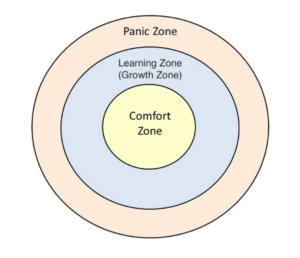How confident do you feel in advancing your career as an accountant or finance professional? Having confidence in yourself and your ability is essential for your advancement, and yet confidence levels can feel wobbly at times. The CAST technique is a vital approach that can help you boost your confidence practically and mitigate some of those confidence wobbles.
Mastering the CAST technique will enable you to progress effectively in your professional journey, assuming you’re going into a leadership role, negotiating a promotion, or getting ready for a large presentation. You will find that examining this spirited technique and studying each element offers practical advice to help you succeed in your career.
Understanding the Importance of Confidence in Career Success
A key element of career success is confidence. It shapes both our own and other people’s perceptions of us. Confident professionals are frequently regarded as more capable, competent, and reliable. Opportunities for leadership positions, promotions, and new opportunities may arise as a result of this perception. Without confidence, even the most skilled professionals may struggle to advance in their careers. Confidence enables us to take risks, pursue our goals, and overcome challenges. It is the foundation upon which successful careers are based.
Lack of self-confidence may be crippling. Missed chances, poor performance, and a hesitancy to pursue aspirational goals can result from it. Many professionals are unable to escape and realise their full abilities because they are caught in a vicious cycle of self-doubt. The CAST technique can be useful to step out of this cycle.
What is the CAST Technique?
The CAST technique is a useful tool that I created to help professionals become more confident and succeed in their careers. It is supported by four main pillars. Each of these pillars is essential for boosting confidence and accomplishing career objectives. The CAST technique offers a methodical way to hone this ability and incorporate it into everyday activities. Professionals can boost their confidence and move confidently through their careers by becoming familiar with and proficient in each of the areas of CAST.
The Four Pillars of the CAST Technique
Comfort Zones
The concept of Comfort Zones can be very useful for helping us to grow in confidence.

Identify things that you feel comfortable doing—i.e., things that you can do with your eyes closed. Comfort zones can be applied in different contexts, e.g., your current role, work more generally, and other parts of your life. This is good to capture, and hopefully, you’ll see that there are loads of things you can do and feel confident doing!
Next, try and think beyond this into your learning zone (growth zone). This can be where the magic happens! Stepping out of your comfort zone could include learning new skills, putting existing skills to other uses, meeting new people, and putting yourself in different situations.
Identify different practical ways that you can spend some of your time trying out or doing these things. Spending more time in your learning zone will help your comfort zone to increase in size, as well as getting you into the habit of regularly trying out new things.
Achievements
You have already achieved a lot in your life, but it’s often easy to either forget or overlook your achievements. Especially when you’re caught up in the day-to-day. Take a blank piece of paper and pick a point in time (primary school is often a good place to start). List out as many things as you can think of, big or small. What have you been proud of achieving along the way?
It can help if you work through time, but the list doesn’t have to be chronologically correct. There may be some other achievements that pop into your mind as you complete this exercise. This may be an iterative process, as we may not be able to think of everything in one go. Finally, most importantly, this list is just for you. Nobody else needs to see it. Nobody is going to judge you for what’s on the list or not. What have you achieved? What are you proud of?
Strengths
We all have skills and strengths. Skills are things that we have learnt and can do (see Comfort Zones above). We have acquired these throughout our lives, through education, training, and getting stuck in and doing them. We can be very good at some of these skills. We also have strengths. Strengths are things that we are naturally good at. We’ve probably been good at these things for most of our lives.
If we use our strengths, this can be enjoyable and can help us move forward faster (like the sails on a sailing boat).
Sadly, we’re not always aware of our strengths—just what I do” or “Surely, everyone else does this too.” But no, although our strengths aren’t exactly unique to us (not quite like a superpower), our combination of strengths is specific to us.
Think about your specific strengths. What do you naturally do well? What do you find easy? What have you always done? Identify 3-5 key things. Now ask 5 people that know you well (from various contexts) for 3-5 words that come to mind when they think of you. What do you notice? Is the feedback similar or different to the words that you came up with? Identify ways to use your strengths more of the time, in your work and in other parts of your life. This will help you feel good (more confident) and may improve your results too.
Triggers
There are different things that can trigger us to feel more or less confident. These will vary from person to person, and yet there are some common categories of triggers. These could include other people who make you feel good. It could be that you know they believe in you or that you can trust them for support. It could be that feeling prepared helps you feel more confident, or getting good feedback, or wearing your favourite shirt.
There are also things that make us feel less confident, e.g., certain people, feeling unprepared, being in a new place, etc. Identifying things that help us feel more confident and stacking the odds in our favour can be useful. As can doing less of, or mitigating, things that make us feel less confident. Create a list of your specific confidence boosters and drainers. Notice how you feel as you go about your week and add any new elements to the list. How can you use more of the confidence boosters and less of the drainers?
The Role of Coaching in Building Confidence
Coaching can be critical in building confidence in professionals and helping them achieve career success. As a career coach, I provide direction, support, and important insights, helping professionals navigate their career paths and overcome challenges. In addition, I offer perspective, which can help boost self-esteem and drive.
You may want to start by booking a 30-Minute Free Career Discussion with me. If you also prefer to jump directly to learning how to build your confidence, my Boost Your Confidence course is the perfect tool to get you started today.

